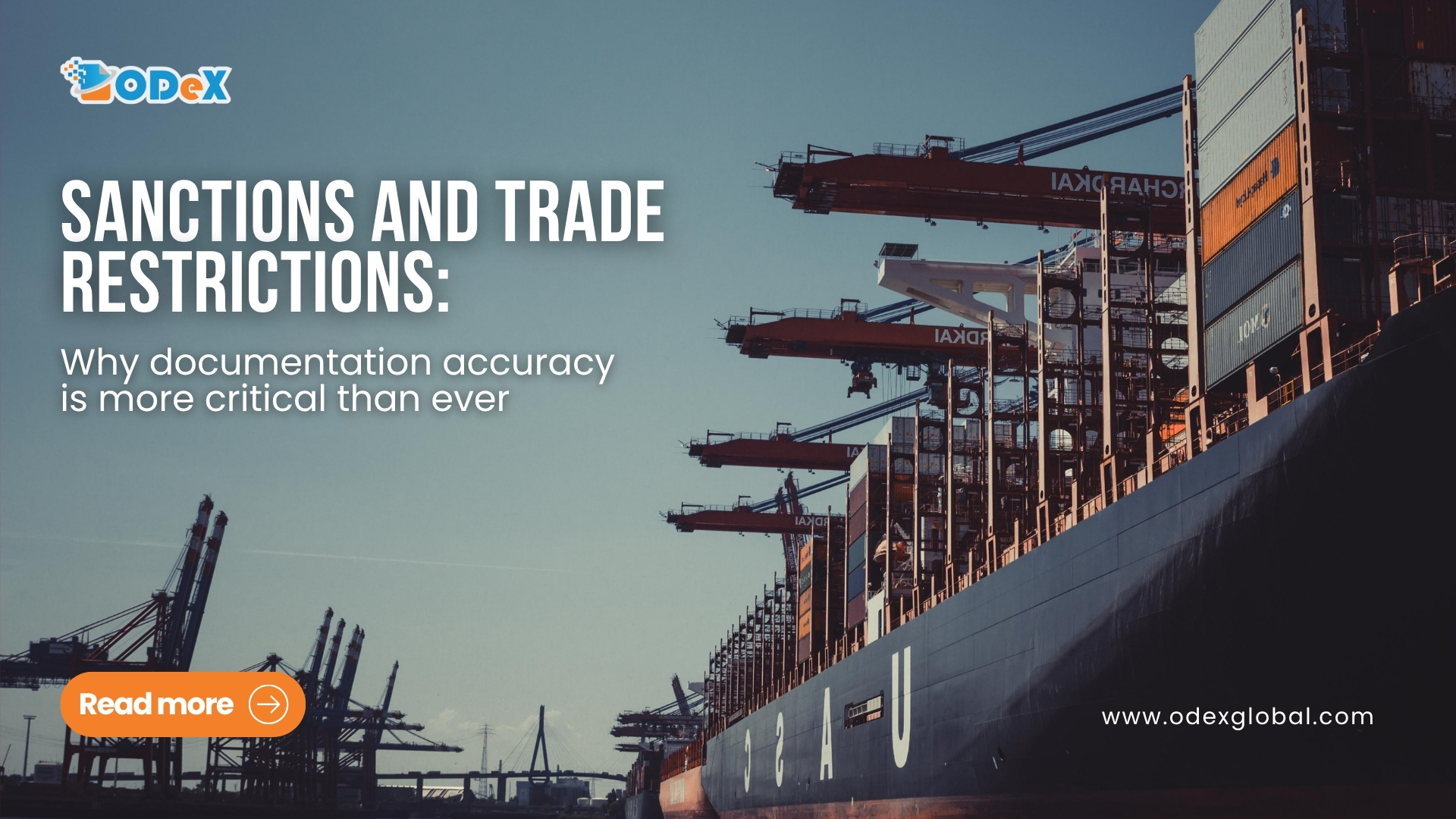Sanctions and Trade restrictions: Why documentation accuracy is more critical than ever
Global trade is undergoing unprecedented scrutiny as sanctions regimes tighten and trade restrictions multiply. The result is a compliance environment where even small errors in shipping documentation can lead to major legal, financial, and reputational consequences.
For shippers, freight forwarders, banks, and carriers alike, the need for rigorous documentation accuracy has never been more urgent. Failure to navigate sanctions properly can result in blocked shipments, fines, seizure of goods, or even criminal penalties.
Yet despite these stakes, many in the industry continue to rely on outdated manual workflows that increase the risk of errors slipping through unnoticed. As trade patterns shift in response to geopolitical tensions, companies that prioritise accurate, validated documentation, and use digital tools to support it, will be better placed to avoid trouble and maintain smooth operations.
Why sanctions compliance has become so complex
A decade ago, sanctions compliance often meant a simple check against a well-known list of embargoed countries. Today, the landscape is far more complex. Governments routinely update sanctions lists, target specific entities or individuals, and impose sectoral sanctions that apply only to certain goods or technologies.
For example, restrictions on dual-use items mean companies must carefully document commodity classifications and end-use declarations. Financial sanctions mean banks are scrutinising trade finance transactions with unprecedented care. Carriers must avoid calling at blacklisted ports or accepting cargo from sanctioned shippers.
All of this relies on clear, accurate, and up-to-date documentation. If the commercial invoice, bill of lading, or export declaration contains errors or vague descriptions, authorities may interpret it as an attempt to evade controls, even when the error was unintentional.
Recent high-profile enforcement trends
Recent years have seen customs authorities, OFAC, and other regulators increase enforcement. Companies have paid multimillion-dollar penalties for failing to prevent goods from reaching sanctioned destinations or parties.
Enforcement agencies are also collaborating internationally, sharing data on trade flows and documentation anomalies. This means even small discrepancies can trigger investigations across multiple jurisdictions.
For example:
-
A wrong HS code that masks a dual-use technology.
-
An incomplete consignee name that hides a blacklisted affiliate.
-
Vague cargo descriptions like "equipment" instead of specific model details.
-
These are not simply clerical mistakes, regulators view them as red flags for sanctions evasion.
-
The risk for shippers and forwarders
While large multinationals often have compliance teams and sophisticated systems, small and mid-sized shippers or forwarders may lack these resources. They rely on local agents, handwritten paperwork, and manual data re-entry between systems.
This is where errors proliferate. Each time shipment data is manually keyed or copied, the risk of mistake grows. Meanwhile, local staff may not be fully aware of fast-changing sanctions requirements.
The case for robust validation
Ensuring sanctions compliance starts with thorough, consistent documentation validation before cargo is accepted or shipped. This means:
-
Checking consignee and notify party details against updated restricted party lists.
-
Verifying HS codes and commodity descriptions to ensure accuracy and avoid misclassification.
-
Ensuring all required licenses or declarations are present and correct.
-
Recording end-user certificates where needed.
Many trade disputes or enforcement actions could be avoided simply by catching these errors before the shipment leaves the exporter’s gate.
How digital tools can help
Manual compliance checks are time-consuming, error-prone, and inconsistent. Digital documentation platforms can embed validation rules directly into workflows:
-
Automatic screening of parties against sanctions lists.
-
HS code validation and matching against controlled goods schedules.
-
Mandatory fields that prevent submission of incomplete data.
-
Audit trails showing exactly who entered or amended data.
Such systems not only reduce errors but also provide evidence of due diligence, a critical defence in any compliance investigation.
The role of collaboration
Sanctions compliance is not just the exporter’s job. Carriers, forwarders, banks, and customs brokers all share responsibility. A weak link anywhere in the chain exposes all participants to risk.
By working together and sharing validated, accurate data through secure platforms, trade partners can build confidence that compliance is being maintained at every step.
Practical steps for shippers and forwarders:
-
Invest in staff training to stay current on sanctions requirements.
-
Adopt digital platforms that support screening and validation.
-
Review internal workflows to close gaps where errors arise.
-
Collaborate with partners to ensure shared data is consistent and up to date.
-
Maintain clear records to demonstrate compliance if questioned.
Conclusion
In an era of increasingly complex and aggressive trade restrictions, documentation accuracy is not just an operational best practice, it is a compliance necessity.
Companies that treat this seriously, invest in better validation, and collaborate with their partners will reduce their risk of fines, delays, and reputational harm. For the global trade ecosystem, that means safer, faster, and more reliable commerce even in uncertain times.
Digital documentation and payment platforms, such as those offered by firms like ODeX, are a key part of the answer, helping businesses modernise their operational processes while staying agile and connected in a rapidly changing world.


















